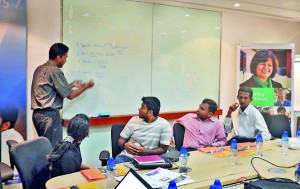Microsoft starts new model engagement with 10 NGO groups
View(s):By Jagdish Hathiramani
The local arm of Microsoft’s Citizenship (community affairs) unit, which advocates IT adoption at the grass roots level, recently started interacting with non-governmental organisations (NGOs) in a novel way; shifting their engagement to ‘Mini Connecting Community Days’ focused on specific subjects.

Microsoft meeting with a group of NGOs
According to Microsoft’s local Citizenship Manager Janakie Karunaratne, this new approach is being used because it is considered a more focused way for groups to engage on relevant subject matter compared to the previous format, which was made up of annual, full-day Connecting Community Day events wherein all stakeholders participated.
With a total of 10 events planned for 2013, and five realised so far, these specialised NGO days have so far been held for subjects such as poverty, development, education, human rights, women and disabilities amongst others.
Carried out with the expertise of one of Sri Lanka’s largest local NGOs, Sarvodaya, these events are used to show NGOs how technology adoption can help them in terms of collaboration, etc. As such, the functionality of Microsoft products, such as Windows 8 and Office365, are also being showcased. At the same time, Microsoft also advises NGOs on how technology can address the particular issues being faced by them, typically in terms of areas such as connectivity, training, etc. In other words, they are offered technology support for a wide array of real world problems. Also, Microsoft is also able to offer these groups access to a large pool of volunteers, and other resources, through their own extensive partner network, when the need arises.
Additionally, the NGOs were given the opportunity to come together in the areas of their specific focus and use their shared knowledge to examine one big problem, with the ultimate goal being to set up email lists, etc., to keep the process of communication and problem solving going for the identified problem.
Meanwhile, Ms. Karunaratne was quick to point out that this is just one of Microsoft’s ongoing Community Affairs projects, and the organisation has a long history of multiple engagements in the field of development. Starting with offering up to 500 free licences, per organisation, for Microsoft products to those registered with the Ministry of Social Services, the company has also been at the forefront of several key development initiatives, with one such being helping to set up Sarvodaya’s tele-centre network in 2005, initially with just 12 outlets. Microsoft was also the first technology company to enter into the North and East post conflict. And continuing this trend, the company has been at the forefront of training ex-combatants with IT and other skills to help re-integrate them into communities and workplaces. So much so, that this programme was responsible for training 1,200 last year, with 65 per cent being women.
Further, Ms. Karunaratne also went on to highlight a project carried out with the help of local social technology company Infoshare, which created, from the bottom up, training programmes keyed to six top Sri Lankan industries. This training, tying in IT, soft skills, etc, and endorsed by organisations such as the Joint Apparel Association Forum (JAAF) as well as other industry bodies, was offered to the Vocational Training Authority as well as private sector training institutes to disseminate. However, there was a cap placed on the amount of fees allowed to be charged.
At the same time, Ms. Karunaratne also spoke about Microsoft’s youth leadership training efforts. Most recently carried out for 200 students from Kilinochchi, this youth leadership programme comprised activity based training, as used by Wild Drift, to foster initiative, working together, etc. Tamil speaking professionals were also included to interact with these young people in their native tongue as well as help motivate them.
Ms. Karunaratne further continued by outlining ongoing community affairs programmes spearheaded by Microsoft, including technology and work skills training for more than 250 disadvantaged children at the SOS Children’s village in Piliyandala in October 2012. Encompassing young children under the age of 10 years, the programme showcased Microsoft products such as MultiPoint whereby a single PC, used in conjunction with multiple, individually-operated mouse devices, could be used to teach an entire classroom full of students.
Another such project carried out by Microsoft, this time in Gampaha, will offer Sri Lankan youth opportunities for training by way of a new Information Communication Technology (ICT) centre being built and set up in collaboration with Lafarge Mahaweli Cement and Sarvodaya Fusion. Initiated by a memorandum of understanding (MOU) signed during the end of October 2012, this centre will be set up by Microsoft and administered by Sarvodaya Fusion once the physical facilities are completed sometime in the near future
Follow @timesonlinelk
comments powered by Disqus



















